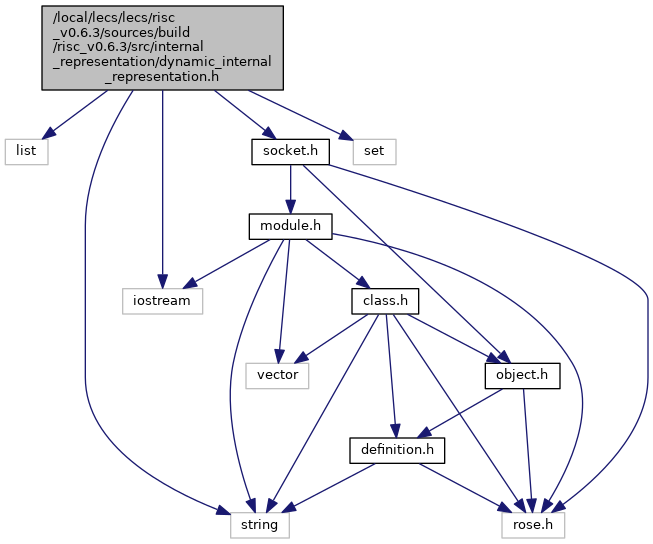All Classes Namespaces Files Functions Variables Typedefs Enumerations Enumerator Friends Macros Pages


Go to the source code of this file.
Classes | |
| class | DynamicObject |
| class | DynamicEventList |
| class | DynamicPort |
| class | DynamicInitSocket |
| class | DynamicTargetSocket |
| class | DynamicPointer |
| class | DynamicReference |
| class | DynamicVariable |
| class | DynamicEvent |
| class | DynamicPrimChannel |
| class | DynamicEventOrListElement |
| class | DynamicEventOrList |
| class | DynamicEventAndListElement |
| class | DynamicEventAndList |
| class | DynamicModule |
| class | DynamicHierarchicalChannel |
Functions | |
| DynamicObject * | get_dynamic_object_of_variable (DynamicModule *root, std::string host_module_type_name, int host_module_instance_id, std::string reference_name, int &instance_counter) |
| This function searches for the mapped variable address of a reference in a given module with a specific instance id. More... | |
| bool | get_instance_id_of_hosting_module (DynamicModule *root, int *address_of_variable, std::string module_name, int &coutner) |
| This function determines to which (instance of a given) module (host module type name) a variable belongs to. The instance counter will provide the instance id. The starting value should be 0. More... | |
| std::pair< DynamicModule *, std::string > | get_host_module_and_name_of_variable (DynamicModule *root, int *variable) |
| This function searchs the the variable address 'variable' in the tree. After finding the variable address the name of the variable and the hosting module will be returned. More... | |
| void | get_all_components_of_type (DynamicModule *root, std::string type_name, std::list< DynamicModule * > &modules) |
| DynamicModule * | get_host_module_of_member (DynamicModule *root, int *address_of_variable, int var_type=0, std::string member_name="") |
| DynamicObject * | find_channel (DynamicModule *root, int *address_of_channel) |
| Finds a channel instance in the dynamic tree via the address. More... | |
| DynamicModule * | get_module_instance (DynamicModule *root, const std::string &name, int instance_id, int &counter) |
| int | get_mapped_channel_id_of_port (DynamicPort *port) |
| void | get_id (DynamicModule *root, std::string name, int *address, int &counter, bool &found) |
| DynamicTargetSocket * | get_target_socket (DynamicModule *root, int *address_of_socket) |
| DynamicInitSocket * | get_initiator_socket (DynamicModule *root, int *address_of_socket) |
| std::set< risc::Socket * > | get_mapped_target_sockets (std::string init_socket_name, std::string host_module_name) |
| std::set< risc::Socket * > | get_mapped_initiator_sockets (std::string target_socket_name, std::string host_module_name) |
| DynamicObject* find_channel | ( | DynamicModule * | root, |
| int * | address_of_channel | ||
| ) |
Finds a channel instance in the dynamic tree via the address.
| void get_all_components_of_type | ( | DynamicModule * | root, |
| std::string | type_name, | ||
| std::list< DynamicModule * > & | modules | ||
| ) |
| DynamicObject* get_dynamic_object_of_variable | ( | DynamicModule * | root, |
| std::string | host_module_type_name, | ||
| int | host_module_instance_id, | ||
| std::string | reference_name, | ||
| int & | instance_counter | ||
| ) |
This function searches for the mapped variable address of a reference in a given module with a specific instance id.
| std::pair<DynamicModule*, std::string> get_host_module_and_name_of_variable | ( | DynamicModule * | root, |
| int * | variable | ||
| ) |
This function searchs the the variable address 'variable' in the tree. After finding the variable address the name of the variable and the hosting module will be returned.
| DynamicModule* get_host_module_of_member | ( | DynamicModule * | root, |
| int * | address_of_variable, | ||
| int | var_type = 0, |
||
| std::string | member_name = "" |
||
| ) |
| void get_id | ( | DynamicModule * | root, |
| std::string | name, | ||
| int * | address, | ||
| int & | counter, | ||
| bool & | found | ||
| ) |
| DynamicInitSocket* get_initiator_socket | ( | DynamicModule * | root, |
| int * | address_of_socket | ||
| ) |
| bool get_instance_id_of_hosting_module | ( | DynamicModule * | root, |
| int * | address_of_variable, | ||
| std::string | module_name, | ||
| int & | coutner | ||
| ) |
This function determines to which (instance of a given) module (host module type name) a variable belongs to. The instance counter will provide the instance id. The starting value should be 0.
| int get_mapped_channel_id_of_port | ( | DynamicPort * | port | ) |
| std::set<risc::Socket*> get_mapped_initiator_sockets | ( | std::string | target_socket_name, |
| std::string | host_module_name | ||
| ) |
| std::set<risc::Socket*> get_mapped_target_sockets | ( | std::string | init_socket_name, |
| std::string | host_module_name | ||
| ) |
| DynamicModule* get_module_instance | ( | DynamicModule * | root, |
| const std::string & | name, | ||
| int | instance_id, | ||
| int & | counter | ||
| ) |
| DynamicTargetSocket* get_target_socket | ( | DynamicModule * | root, |
| int * | address_of_socket | ||
| ) |
 1.8.5
1.8.5